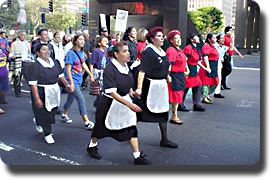The people who make up your fancy hotel room are invisible, but powerful – now that they’ve realized they can put downtown economies through the wringer
Every morning shortly after 6 a.m., Althea Porter leaves her Mississauga home for a trek into the core of Toronto, where she works at a large Holiday Inn whose shape begs comparison to a wedding cake.
She makes up 16 rooms each day, and is joined, on busy days, by some two dozen other room attendants. If everything’s going smoothly, it should take a veteran attendant like Porter about 30 minutes to get a room ready for the next guest. That means stripping the sheets, replacing the bedding, cleaning the coffee pot and glasses, swabbing the bathroom, collecting the garbage, replenishing the soap, towels and stationery, and generally straightening up the place.
If everything isn’t going smoothly – if there’s a foyer full of conventioneers waiting for rooms or if Porter has to scour the hotel looking for supplies the day becomes a race against time. She routinely skips breaks and wolfs down her lunch. “Sometimes,” Porter says, “people don’t even take lunch.”
Business people, says Filomena Canedo, an attendant who works on the other side of downtown at the Royal Meridien King Edward Hotel, tend not to make a big mess: “They just check in for one night.” And long-term guests are the ones who are most likely to leave a note of thanks. But with tourists, kids’ hockey teams or revellers in town for New Year’s or a festival like Caribana, it’s another story. “When you have families in the summer, then you have rooms that are really trashed,” says Porter. “Those are the worst times for room attendants.”
And over all, their jobs have gotten a lot tougher in the past year or two. Responding to competitive pressure, many hotel chains have laid on splendid queen- or even king-sized mattresses, plush duvets, extra pillows and other goodies for guests. “They call it ‘signature service,’ where everything is well done,” says Canedo. “You put out the amenities so that when the guest enters the room, it’s a heavenly place to stay, a second home. We do that every day.”
Problem is, the attendants are still only getting 30 minutes per room. And when the mattress is large and heavy, upwards of 50 kilograms, it’s awkward to change the sheets. Because of that extra weight and the bulky new duvets, attendants are suffering back and shoulder injuries. “I don’t mind serving the guests, but not when it affects my health,” says Porter, who earns $14.68 per hour after 13 years in the industry.
Workers like Porter have become more outspoken about the workload: This year, with no fewer than 400 hotel contracts up for renegotiation across North America, their union, UNITE HERE, has launched a hard-nosed bargaining campaign. The union, a 450,000-member giant created in 2004 with the merger of needle trades and hotel unions, aims to persuade the industry to provide its employees not with just higher wages but also with improved working conditions. Specifically, the union is looking for a reduction in the number of rooms an attendant must make up per shift and a guarantee that everyone gets breaks, to stop the practice of “working off the clock.”
Paul Clifford, president of the UNITE local in Toronto, points to other “quality-of-life” issues, such as stiff-by-design mattresses. For guests, that’s about getting a good night’s sleep. But the room attendants have to lift the whole mattress when they change the sheets another factor that helps explain their injury rate, now higher than that of construction workers, according to union officials. The customer doesn’t always come first, says Clifford. “Health and safety should trump everything.”
Clifford points out that, during UNITE’s talks with the Fairmont chain, the union negotiated a “reasonable workload” provision in its contract, unprecedented language, he adds. The three-year deal, covering 850 employees, also included wage increases of between 9.3% and 10.5%, and subsidized public-transit passes.
Given the Fairmont Royal York’s flagship status in town, the deal was met with a sigh of relief across Toronto’s tourist industry. In 2004, hotel staff in San Francisco walked out and crippled the convention industry, which normally gushes expense-account money into restaurants, retailing, culture and tourism.
Toronto, still suffering from the SARS stigma, is gearing up for a year of cultural celebrations designed to attract tourists, which means leverage for the union:There are no less than 30 hotel agreements up for renegotiation in the city this year. As Porter says, “The room attendants are the backbone of the hotels because if the rooms aren’t clean, they can’t sell them.”
Unions like UNITE, the Service Employees International Union and the United Steelworkers have been increasingly successful in expanding in big-city service sectors security guards, taxi drivers, janitors, garment workers and long-term-care staff that depend on an ever-expanding pool of immigrants. In fast-growing Las Vegas, UNITE’s membership has leapt to 50,000, from 10,000 in 1987.
Compared to negotiating higher wages for middle-class civil servants, signing up the service sector is a return to the working-class roots of the labour movement. And it’s the only place where unions can swell their ranks, given that membership has declined elsewhere. “For unions, it’s a no-brainer,” says Anil Verma, an industrial relations expert at the University of Toronto’s Rotman School of Management.
Tourism Toronto estimates that seven of 10 local hotel workers are new Canadians, mostly from the Philippines, China, Sri Lanka and South America. The average salary is $10.48 an hour, while the median housekeeper wage is $26,000 a year. It’s not quite below the poverty line, but many room attendants hold down two or three jobs to make ends meet in high-cost Toronto.
Porter and Canedo face a familiar immigrant quandary: Porter, who is from Jamaica, was a fashion designer before settling in Canada; Canedo left her children behind in her native Philippines, where she was a high school teacher. “I thought coming here would give me a lot of opportunity,” says Canedo. “I ended up being a room attendant. I had to love my job and do it in order to raise my kids back home.”
Once inside the hotel world, both women discovered its rigid class system: The front-of-house desk staff are perched at the top, followed by switchboard operators, then room supervisors, room attendants and, at the bottom of the heap, laundry workers. The front of the house tend to be white; behind the scenes, non-white.
Lilian Salvador, who also works at a Toronto Holiday Inn but is on medical leave with a shoulder injury, says that in the event of a dispute, management will always find the room attendant in the wrong. “If the room attendant has a complaint, they are reprimanded,” she says. Room attendants who want to move up the ladder find their ambitions thwarted if they are considered to be “troublemakers,” adds Salvador.
This frustration of upward aspiration is the very grist of labour organizing. “Look,” says U of T’s Verma, “making beds is not a new occupation. It’s just that we’re setting higher standards for quality of life and work in our society, so [these employees] need training and career mobility, just as in the auto and steel industries.”
In the meantime, comfort is a zero-sum game: The traveller’s luxurious thread-count is the room attendant’s backache.
Saturday, April 29, 2006


